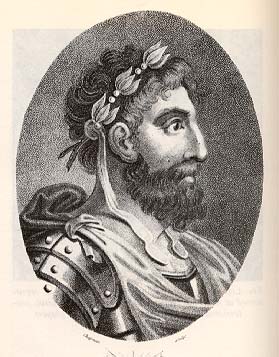
Biography
Xenophon was an Athenian military leader and author, who, along with Plato and Aristophanes, remains one of our chief literary sources regarding the way of life of Socrates, his deeds as well as his speeches. Unlike Aristophanes and Plato, however, Xenophon was also a man of action who embarked on a military career, which he describes at length in his literary autobiography, the Anabasis. Indeed, Xenophon is as well known for his works that center on Socrates as he is for his “historical” writings, which focus on Sparta, Persians, generals and kings, as well as horses and dogs. All of his writing, whether Socratic or “historical,” seek to show how philosophic questions are embedded in everyday life.
Expedition to Persia
We know little about Xenophon’s very early life. He was born into an aristocratic family around 430 BCE in Athens to a certain Gryllus, but the exact date is not known. In his early years, Xenophon apparently belonged to the circle around Socrates. Seemingly against the advice of Socrates, Xenophon (probably around 401 BCE) became part of a Persian expeditionary force led by Cyrus the Younger against his older sibling, King Artaxerxes II of Persia. The events of this invasion of Asia Minor are told in Xenophon’s Anabasis (literally, “ascent” or “march from the sea to the interior”). Cyrus set out under a false pretext with a Persian army and a considerable number of Greeks. By the time they arrived at Tarsus, Cyrus’ troops became aware of his scheme to depose the king, and refused to continue. Clearchus, a Spartan general, persuaded the Greek contingent of Cyrus’ forces to continue, and they fought the troops of Artaxerxes II in the Battle of Cunaxa, where Cyrus was killed. A peace conference was convened in which Clearchus and four other generals and a host of captains were betrayed and brutally executed. The so-called “ten thousand” Greek mercenaries were now without a leader, deep in enemy territory. Xenophon along with several others was chosen to lead, and the “ten thousand” marched on, facing Persian and Medean forces until they arrived at Trapezus on the Black Sea. The joyful cries of the Greek soldiers upon reaching the sea, thalatta, thalatta, (the sea! the sea!), were deeply ingrained in the classical memory of Western civilization until the day before yesterday. Indeed, the lines appear and reappear in literature, for example in the first chapter of James Joyces’ Ulysses. Because of its relatively straightforward prose, the Anabasis of Xenophon was for many centuries a primary text in the instruction of ancient Greek.
Exile
Xenophon campaigned with the Thracians and Spartans, and sometime after Socrates’ trial he was exiled from Athens. He then fought under the banner of the Spartan King Agesilaus II, and the Spartans eventually gave him land at Scillus, in Elis. He lived on his estate with his wife and two sons, where he composed the Anabasis and other works. He then lived in Corinth, and perhaps returned to Athens. He died around 354 BCE.
Works
Among Xenophon’s works are several devoted to Socrates: Memorabilia, Oeconomicus, Symposium, and Apology. In addition, he wrote several “historical” works including the Cyropaedia and Hellenica, as well as the Anabasis, and several smaller works on horsemanship, cavalry, tyranny, hunting, Sparta, and other matters.
For more biographical reading, see also:
John Dillery, Xenophon and the History of his Times, London: 1995.